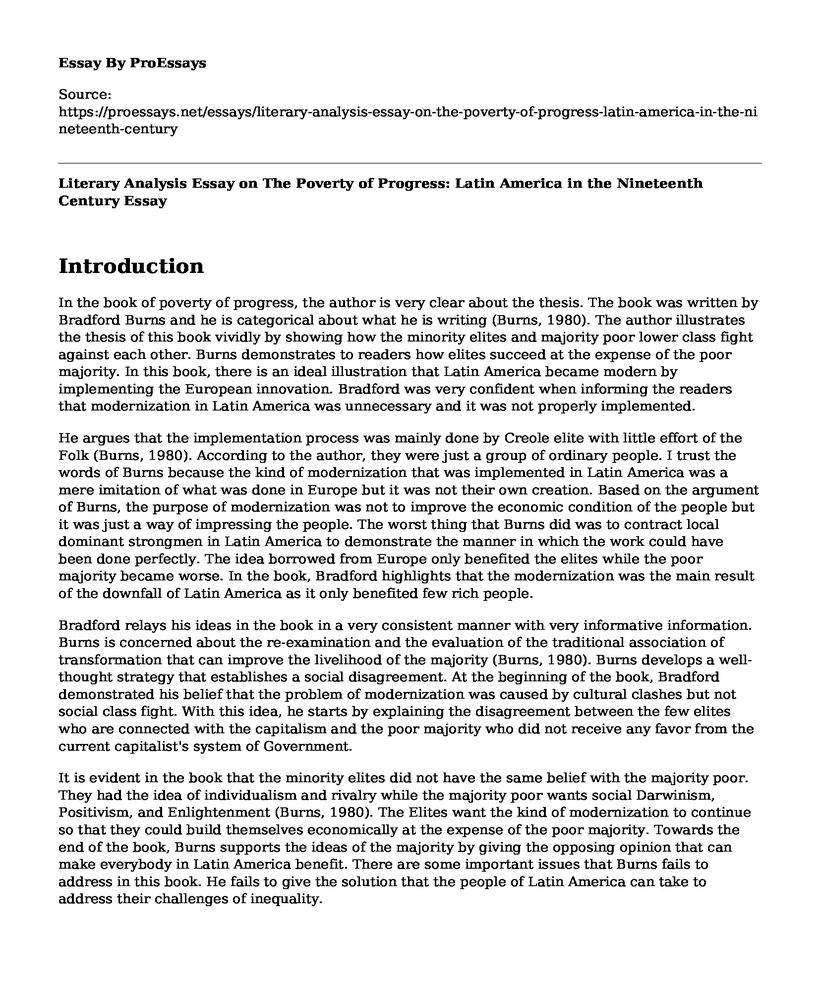Introduction
In the book of poverty of progress, the author is very clear about the thesis. The book was written by Bradford Burns and he is categorical about what he is writing (Burns, 1980). The author illustrates the thesis of this book vividly by showing how the minority elites and majority poor lower class fight against each other. Burns demonstrates to readers how elites succeed at the expense of the poor majority. In this book, there is an ideal illustration that Latin America became modern by implementing the European innovation. Bradford was very confident when informing the readers that modernization in Latin America was unnecessary and it was not properly implemented.
He argues that the implementation process was mainly done by Creole elite with little effort of the Folk (Burns, 1980). According to the author, they were just a group of ordinary people. I trust the words of Burns because the kind of modernization that was implemented in Latin America was a mere imitation of what was done in Europe but it was not their own creation. Based on the argument of Burns, the purpose of modernization was not to improve the economic condition of the people but it was just a way of impressing the people. The worst thing that Burns did was to contract local dominant strongmen in Latin America to demonstrate the manner in which the work could have been done perfectly. The idea borrowed from Europe only benefited the elites while the poor majority became worse. In the book, Bradford highlights that the modernization was the main result of the downfall of Latin America as it only benefited few rich people.
Bradford relays his ideas in the book in a very consistent manner with very informative information. Burns is concerned about the re-examination and the evaluation of the traditional association of transformation that can improve the livelihood of the majority (Burns, 1980). Burns develops a well-thought strategy that establishes a social disagreement. At the beginning of the book, Bradford demonstrated his belief that the problem of modernization was caused by cultural clashes but not social class fight. With this idea, he starts by explaining the disagreement between the few elites who are connected with the capitalism and the poor majority who did not receive any favor from the current capitalist's system of Government.
It is evident in the book that the minority elites did not have the same belief with the majority poor. They had the idea of individualism and rivalry while the majority poor wants social Darwinism, Positivism, and Enlightenment (Burns, 1980). The Elites want the kind of modernization to continue so that they could build themselves economically at the expense of the poor majority. Towards the end of the book, Burns supports the ideas of the majority by giving the opposing opinion that can make everybody in Latin America benefit. There are some important issues that Burns fails to address in this book. He fails to give the solution that the people of Latin America can take to address their challenges of inequality.
Conclusion
This is a very interesting book that I would like to read and discuss with my friends. The book highlights key issues that happen in most of the countries. It explains how the majority poor are neglected in the society (Burns, 1980). It shows how few elites take advantage of the majority poor to enrich themselves without considering their poverty condition. I would, therefore, recommend this book to many people because it enlightens us on the things that happen that we would not like to happen in our communities.
References
Bradford Burns, The Poverty of Progress: Latin America in the Nineteenth Century (Berkeleyand Los Angel: University of Califonia Press, (1980), 84-85.
Cite this page
Literary Analysis Essay on The Poverty of Progress: Latin America in the Nineteenth Century. (2022, May 09). Retrieved from https://proessays.net/essays/literary-analysis-essay-on-the-poverty-of-progress-latin-america-in-the-nineteenth-century
If you are the original author of this essay and no longer wish to have it published on the ProEssays website, please click below to request its removal:
- Critical Essay on Similarities between Antigone in "Antigone" and Nora in "A Doll's House"
- Farm City: The Education of an Urban Farmer Essay
- Macbeth and Lady Macbeth Relationship Essay
- Essay Sample on Love & Obedience in 1984: Winston & Julia's Rebellion Against the Party
- Essay Sample on Victor & Henry: Closest Friends in Mary Shelley's Frankenstein
- Paper Example on Novelists' Artistic Freedom vs. Protagonist's Rights: A German-US Comparison
- Bill Gates as Leader - Biography







